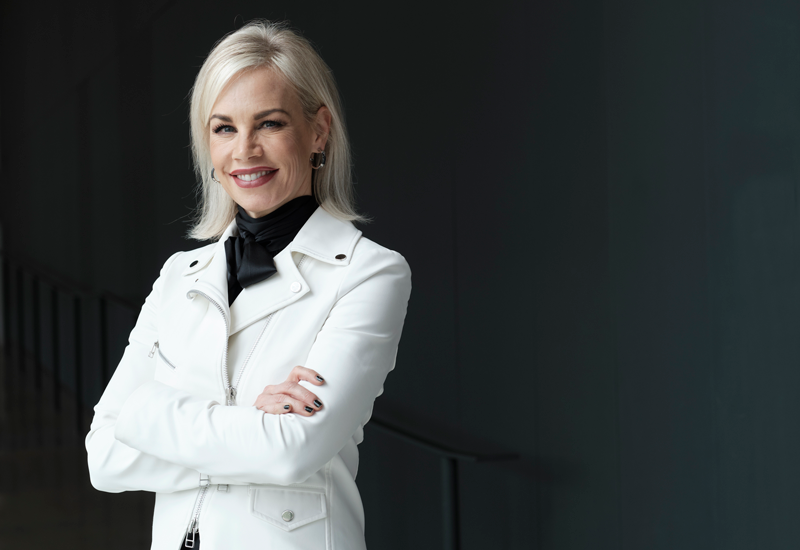
The road less traveled
Melinda Richter creates life science incubator with the express intent of removing barriers for entrepreneurs around the world.
Edwards alumna Melinda Richter (B.Comm.'92) fast-tracked her career at Nortel Networks through Calgary, Toronto, Raleigh, NC, and London, England, to Beijing. She would be relocating from Beijing for a new posting soon but had one last educational retreat to attend. It involved a trek through the woods to the International Beijing University.
Richter had no idea what the ripple effect of attending that retreat would be in the trajectory of her life and career.
Within 24 hours of arriving, Richter was in an international health clinic due to a bug bite. Her doctors broke the news that there was nothing more than they could do for her.
“It was ironic. Here I was, working with the leading telecoms company. We were trying to figure out how to order a soda from the vending machine with my cell phone, and yet they couldn’t take a blood test to figure out what I had,” said Richter. “At that moment, I vowed if I had the chance to stay on this planet, I would try to make a difference in healthcare.”
Bringing an idea to life
Disrupting innovation in the healthcare industry would be no small feat. It takes on average, 8-12 years, and billions of dollars to get a drug to market explained Richter.
“I wasn’t a scientist, but I was a good business person,” said Richter. “I knew there was a problem we needed to solve. We needed to make it faster, cheaper, and easier to start a life science company.”
In the meantime, Richter started on the road to recovery and went onto complete an MBA at INSEAD. Together with her experience from Nortel, Richter went out on her own and established Prescience International in San Francisco in 2002.
Prescience International offered big company infrastructure from a time and scale perspective to early-stage life science entrepreneurs. Richter raised $6 million in grant financing and opened a 36,594 square foot facility.
Half the space in the incubator was an intentional common community space filled with millions of dollars of equipment. It removed a barrier of access for the entrepreneurs; they didn’t need to raise a round of financing, and the space fostered research collaborations among the participants. The other half of the space was comprised of individual wet labs, dry labs, and office modules where you could rent an area as small as a five-foot bench to start your company.
“Within the first five years, the companies raised about a billion dollars,” said Richter. “More importantly than that, the companies were able to do in 8 months what have taken them four years to do before.”
The statistics spoke for themselves, but there was still more work to be done.
“Had we changed the scale of the healthcare innovation model? Not even close,” reflected Richter. “To do that, we would have to expand.”
Collaborating to accelerate growth
Richter then partnered with Johnson and Johnson in San Diego. Their collaboration resulted in the concept for JLABS, model 2.0. There are now 13 locations across the globe, including the newly announced Washington, DC site, in addition to centers in Belgium and Shanghai.
Today, the vision is to embed JLABS in innovation ecosystems around the world with the express intent of removing barriers for entrepreneurs.
According to Richter, collaboration has been a critical component in the success of JLABS.
“Every ecosystem we go into, we partner with someone,” explained Richter. “I want our JLABS to be their JLABS, the community’s JLABS.”
In Shanghai, JLABS collaborated with the Shanghai Municipal Government, the Pudong New Area government and the Shanghai Pharma Engine Company, Ltd. In Washington, DC, partners include the Children’s National Hospital and the Biomedical Advanced Research and Development Authority (BARDA). In Toronto, JLABS partnered with the University of Toronto, MaRS innovation group, the MaRS Discovery District, and the Government of Ontario.
Leading authentically
When it comes to the evolution of her leadership journey, Richter credits her success to understanding organizational behavior and people.
“Part of the reason why JLABS has been so successful in such a short time has to do with understanding people,” said Richter. “I believe in having a culture of authenticity. I think that’s a big change I’ve recognized in my leadership style. It is important to set people up for success and to enable all of your stakeholders to show up as their best selves.”
And for the next generation of global leaders, Richter advises harnessing the grit and determination that Saskatchewan people are known for.
“You will go around the world and realize the world is very small and that you can be a leader in it,” said Richter. “If you come in with a can-do attitude, you can do anything you set out to do. Think big, start small, and stay humble.”
